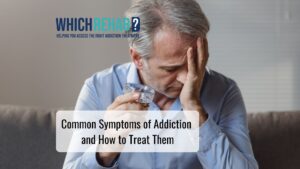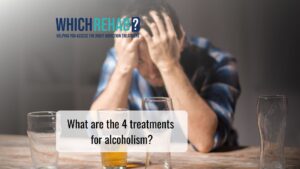Alcoholism, a debilitating condition characterised by an uncontrollable and harmful desire for alcohol, permeates every facet of an individual’s life.
While the causes of alcoholism are diverse, including genetic predispositions, environmental factors, and personal experiences, its detrimental effects on health, relationships, and overall well-being are profound.
This article explores the four primary treatments for alcoholism, each tailored to address different aspects of the condition. From behavioural therapies to medications, 12-step programs, and individual/group counselling, these treatments offer a multifaceted approach to help individuals regain control over their lives and embark on a path to sobriety.
What is Alcoholism?
Alcoholism is an illness where people lose control over their alcohol drinking and have an uncontrollable and harmful desire to drink more. It’s a dreadful condition and affects almost every part of a person’s life.
People with alcoholism are classed as dependent drinkers. This means that they find it hard to function without drinking some level of alcohol in their system, and if they don’t have this, they suffer serious physical and mental withdrawals.
Alcohol misuse affects a person’s quality of life and relationships, but they don’t always find it easy to see or accept this. The condition comes with an impaired ability to stop or control alcohol use, often leading to heavy drinking despite adverse social, work or health consequences.
People with alcoholism have a strong alcohol cravings and will continue to drink even though it causes problems in their lives. They may experience physical symptoms such as withdrawal symptoms when they stop drinking and as they develop a tolerance to alcohol. This means they need to drink more and more to get the same effect.
How Does Someone Develop Alcoholism?
Many factors contribute to someone becoming alcohol dependent, including genetics, environmental and personal experiences.
There is no single cause of alcoholism, but it is thought to be caused by a combination of factors from upbringing, learned behaviours, misguided thoughts and feelings, anxiety and, often, trauma.
Here are some of the risk factors that can lead to alcoholism:
- a family history of alcoholism
- a mental illness such as depression or anxiety
- experiencing trauma or abuse
- drinking at a young age
- heavy drinking in large amounts and/or frequently
- peer/social pressures

What is the Rehabilitation Process for Alcoholism?
There is no cure for people with alcohol use disorder, but it is a treatable disease.
So, what is the rehabilitation process?
Well, there are a variety of treatment options available including behavioural therapies, mutual aid groups including the Anonymous fellowships, medications, counselling and other support groups, such as recovery cafes to help maintain abstinence.
For people who have had long-term alcohol issues, abstinence is usually a recommended prerequisite to treatment, because they cannot drink safely at any level.
In very rare cases, some people may be able to drink safely at some level after treatment, especially if their alcohol dependence was caused by a sudden change in life circumstances, such as bereavement. However, most people with an alcohol dependence require total abstinence if they are to recover in the short and long-term.
At Which Rehab, we certainly promote abstinence. Through our many years of experience in helping people overcome alcoholism, we’ve seen that this gives a much better chance of long-term recovery.
Treatment helps people with alcoholism learn to manage life sober and live healthy, productive lives.
If you are concerned that you or someone you know may have alcoholism, there are plenty of resources available to help. You can talk to your doctor or a mental health professional, speak to us or contact a support group such as Alcoholics Anonymous.
What are the Signs and Symptoms of Alcoholism?
Some common tell-tale signs and symptoms of alcoholism/alcohol dependence are:
- Needing to drink more alcohol to get the same effect (tolerance)
- Experiencing withdrawal symptoms when you stop drinking
- Spending a lot of time thinking about drinking, getting alcohol or recovering from the effects of alcohol
- Having a strong urge or craving to drink
- Failing to meet your major obligations at work, school or home due to drinking
- Continuing to drink even though you know it’s causing problems in your life
RELATED ARTICLE
Common Symptoms of Addiction and How to Treat Them
Anyone with any experience of addiction will know it can manifest in a wide range of behavioural and physical symptoms.
Understanding and recognising these symptoms of addiction is crucial for seeking appropriate help and support.
BREAK FREE FROM ADDICTION
Our team of rehab and addiction specialists are on hand to talk to you day or night.
The four most common treatments for alcoholism
Treatments for alcoholism varies in delivery and type. The most appropriate treatment usually depends on the level of alcohol misuse and how unwell the individual is in terms of their mental and physical health.
Treatment options range from attending a residential clinic such as an alcohol detox unit or alcohol rehabilitation centre as an in-patient, attendance at an outpatient rehab, home treatments and/or via weekly sessions, including online therapy.
What specific treatment and how intensive this treatment is, is usually determined in consultation with an addiction specialist or medical professional. Usually, people who are very unwell with alcohol and suffering from chronic alcoholism would qualify for inpatient rehab, where a stay in a residential facility would probably save their life.
The modality of treatment – that is, what specific types of treatment regardless of whether it’s inpatient or outpatient – can be broken down into four categories:
- Behavioural Therapies
- Medications
- 12-Step Programs (Mutual Aid)
- Individual Counselling & Group Therapy
If you’re looking for the right alcohol rehab for your situation, check out our blog on the ‘Best Alcohol Rehabs in the UK‘.
Let’s look into each of the treatments for alcoholism further.
Behavioural Therapies

Behavioural therapies for alcohol treatment are a type of therapy that focuses on helping people change their behaviour related to alcohol use.
These therapies are based on the idea that our thoughts, feelings and behaviours are all interconnected, and that changes our thoughts and behaviours lead to changes in our feelings.
Behavioural therapies are very effective in helping people to stop drinking and stay stopped. It’s important to understand that behavioural therapies are not a quick fix as they require time and effort from the alcoholic in order to change.
Often, they are most effective when used in combination with other treatments such as medication and support groups. And, it’s always a good idea to have therapy when sober, otherwise the real person isn’t really present at the therapy, especially if intoxicated.
Here are some of the most common behavioural therapies for alcohol treatment:
Types of Treatment Available
Cognitive-behavioural therapy or CBT is a type of therapy that helps people to identify and change negative thoughts and beliefs that may be contributing to their drinking. CBT is based on the idea that our thoughts, feelings and behaviours are all interconnected and if we can change one of them, we change the others.
In CBT for alcoholism, the therapist will work with the client to identify the negative thoughts and beliefs that are contributing to their drinking.
The therapist will then help the client to challenge these thoughts and beliefs and develop more realistic and helpful ways of thinking.
For example, a person with alcoholism may have the thought:
“I can’t relax without alcohol.”
A CBT therapist would help the person to challenge this thought by asking them questions such as:
“What evidence do you have to support this thought?”
and…
“Are there other ways to relax besides drinking alcohol?”
The therapist would then help the person to develop more realistic and helpful ways of thinking, such as:
“I can relax without alcohol by doing other activities that I enjoy such as reading, taking a bath, or spending time with loved ones.”
CBT for alcoholism is a very effective treatment. It helps people develop healthy coping mechanisms and strategies to stay sober. For example, the therapist may teach the client how to identify and avoid triggers that lead to drinking and how to deal with cravings when they happen.
Here are some of the benefits of CBT for alcoholism:
- Helps people to identify and change the negative thoughts and beliefs that are contributing to their drinking
- Helps develop coping mechanisms and strategies for staying sober
- Creates new ways of thinking about self and our relationship to others and the world
- Over time change a person’s behaviours and feelings in a healthy way
Motivational Enhancement Therapy
Motivational enhancement therapy (MET) is a therapy that helps motivate people to change their drinking behaviour. MET therapists use different tools and techniques such as helping people to identify why they want to stop drinking, encouraging and helps them to help them set goals for stopping and to develop a plan for sobering up.
This therapy is a good choice for clients attending an outpatient rehab, where the client doesn’t have the 24-hour care of treatment staff and might need that extra chunk of drive to not pick up a drink.
MET is based on the idea that people are more likely to change their behaviour if they are motivated to do so. Like any other therapy, the therapist doesn’t tell people what to do but rather they helps them come up with their own reasons for wanting to stop drinking and to develop their own plans for doing so.
It’s a very effective treatment for alcoholism and is becoming increasingly used as positive research on its effectiveness increases. It helps people cut down on drinking and also to stop drinking entirely. Compared to other forms of therapy, it’s a relatively short-term treatment lasting between four and six sessions normally.
Here are a few of the benefits of using MET:
- helps people to increase their motivation to change their drinking behaviour
- the client is in charge of all of their own treatment, therefore empowering them
- it’s a short-term treatment, typically lasting for 4-6 sessions
- the compounding nature of increasing dopaminergic “hits” means the more it’s used the more successful it becomes as a therapy
Motivational enhancement therapy helps clients understand their thinking and adjust in order to provide drive to accomplish change. Using a skill called reflection, the therapist reflects or echoes back to the client what they just heard from the client, which helps the client to understand their own thoughts and feelings.
Other skills the therapist uses include empathy, where the therapist expresses compassion and understanding of the client’s situation in order to build rapport and trust. Affirmation is important in MET and the therapist builds the client’s confidence by affirming the client’s strengths and abilities.
Evocation is another tool the MET therapist uses to help the client to induce their own reasons for wanting to stop drinking and to develop their own plans for change. MET can be used by itself or in combination with other treatments such as medication and support groups too.
Contingency Management
Contingency management (CM) is a behavioural therapy that uses rewards and incentives to help people change their behaviour. CM is based on the idea that people are more likely to repeat behaviours that are rewarded and less likely to repeat behaviours that are punished.
When it’s used to treat alcoholism, the client is rewarded for meeting certain goals such as having a certain number of continuous sober days. Rewards can be anything from physical rewards such as money, vouchers or prizes or they can be intangible including things like praise or recognition.
Research has grown in this area, and it’s become a popular and effective treatment for alcoholism in recent years. It’s used to help people stop or cut down on their drinking. It’s also a short to medium-term treatment typically lasting for 10 – 16 weeks.
The benefits of contingency management for alcoholism include:
- a very effective treatment in a short space of time with results after week one
- significantly increase rates of abstinence from alcohol both during and after treatment
- tailored to the individual client’s needs
- helps people reduce their risk of relapse after completing treatment
Examples of using contingency management include
- client is given a voucher for shops or events for every day that they are sober
- clients paid money for every week that they are sober
- given praise such as a badge, chip or certificate for every month that they are sober
It’s a safe and effective treatment that is used by people of all backgrounds. It is also a low-cost form of therapy and used anywhere including treatment programs, outpatient clinics and at home.
Family Behaviour Therapy (FBT)
Family behaviour therapy or FTB involves the family members of the alcoholic. It’s based on the idea that alcoholism is a family disease and that the family plays a vital role in the person’s recovery.
It’s a very common therapy to receive in alcohol rehabs, where loved ones are invited to join in whilst the client undergoes treatment.
The therapist helps the client understand clear expectations and boundaries in their behaviour among the family such as zero tolerance of any drinking or related behaviours.
The therapy breeds open communication between therapist, client and family in the hope that honesty and openness about feelings and feedback help family bonding and bring joy to the home. It’s a very supportive therapy and involves praise and reward for sobriety and helps the addict develop relapse prevention strategies.
Therapists also help clients deal with difficult behaviours related to drinking, bringing tools to manage conflict in the home. Ultimately the goal is to help the alcoholic take control of self-care – an area people who drink find rather difficult – including basics such as getting enough sleep, eating healthy, emotional control and getting enough exercise.
Family behaviour therapy is a very successful treatment and can be used to stop or cut down. It’s also a relatively short to medium-term treatment, typically lasting for 12-16 sessions or weeks.
The benefits of family behaviour therapy for dependent drinking include:
- Improved relationships as communication and trust between family members increases
- Relapse reduction as it helps to develop relapse prevention strategies and identify triggers
- Helps family members learn more about alcoholism and how to support their loved one
If you are a family member of a person with alcoholism, family therapy is a valuable resource. It helps you to support your loved one in their recovery as well as improve your own health and well-being. Contact us to find out more about how to set up family therapy.
DON'T STRUGGLE ALONE
Battling addiction alone is a losing fight.
At Which Rehab, we’re here to support you from addiction to recovery.
Medications
Medications to help people stop drinking and stay stopped can be an extremely successful device to support the treatment of alcoholism.
They offer various support mechanisms from helping to reduce cravings and preventing relapse by making drinking less enjoyable.
Medications can be a valuable tool for people who are trying to stay sober. However, it is important to note that medications are not a cure for alcoholism. They must be used in combination with other treatments, such as therapy and support groups, for the best results.
There are four main medications that are regularly used for the treatment of alcohol use disorder (AUD): Naltrexone, Acamprosate, Disulfiram, and Topiramate.
Naltrexone (Vivitrol)
Naltrexone is a medication that helps people reduce or abstain from drinking because it removes the effects of alcohol on the brain.
It reduces cravings for alcohol and helps remove cravings to drink. It also helps people to drink less if they do relapse.
The medication is in a class of drugs called opioid antagonists that work by blocking the reward effects of alcohol on the brain. This makes drinking less pleasurable as the alcohol doesn’t affect the brain as it normally would without the drug which helps people to reduce their drinking or stop drinking altogether.
Naltrexone is normally available as a pill that is taken once a day.
Acamprosate (Campral)
Acamprosate is a medication that helps reduce cravings or the obsession to drink.
Although scientists are not exactly sure how it works, they believe it restores a kind of balance to brain neurotransmitters that are affected by sustained alcohol consumption. This allows brain chemicals to settle that would otherwise be agitated in a drinker and may increase dopamine levels slightly so that alcoholics don’t look for a “hit” as intensively.
Some of the key benefits of Acamprosate are a reduced risk of relapse and a help for people to drink less if they do relapse. The medication is found to be very effective when used with other forms of treatment, particularly psychological treatments.
As well as its main effect on neurotransmitters to lessen cravings, it has also been found to reduce withdrawal symptoms and improve sleep quality. Acamprosate is normally administered in pill form.
Disulfiram (Antabuse)
Disulfiram is an abstinence medication that should only be taken after detox once all alcohol traces have been removed from the body.
It works by blocking the breakdown of alcohol in the body if someone drinks, therefore causing unpleasant side effects. These side effects can be very unpleasant and also dangerous, so it’s not a medication to be taken lightly.
Some of the effects of drinking whilst in the medication can include flushing, nausea, vomiting, headache, chest pain, sweating, choking, breathing difficulty and anxiety.
People who take disulfiram should be made fully aware of the physical ramifications of drinking whilst it’s in their system. This can help people to avoid drinking altogether, knowing they could become very unwell. Disulfiram is available as a pill that is taken once a day or as an injection that is given every few months.
Disulfiram is not right for everyone. It should not be taken by people who are allergic to it, who have certain medical conditions including heart conditions, as the reaction to alcohol on it can be very distressing on the body.
If you are considering taking disulfiram, please talk to us about the risks and benefits of it. Having said this, it is generally a safe abstinence medication and a very successful treatment for people who are serious about recovering from alcohol addiction.
Topiramate (Topamax, Trokendi XR)
Topiramate is a medication that has also been shown to be effective in helping to treat alcoholism. Similar to acamprosate, it is thought to work by reducing cravings for alcohol., although the full pharmacology is still yet unknown.
Topiramate is an anticonvulsant (anti-seizure) medication that is also used to treat migraine headaches. It is believed that it affects a number of different neurotransmitters in the brain, including dopamine which keeps these chemicals at a stable level helping to prevent the obsession and craving for alcohol.
Topiramate is seen as more of an assistant in overcoming alcohol rather than a panacea but it helps people to reduce their drinking and improves their chances of long-term sobriety. It can also help to reduce cravings for alcohol and make it easier to resist the urge to drink.
Topiramate is available in tablet form and is taken once or twice a day.
12-Step Programs

12-step programs are self-help groups and a set of guiding principles (of which there are 12!) that provide support for people recovering from addiction. They are based on the principle that people can help each other to recover by sharing their experience, strength and hope.
They are the working part or program of the Anonymous Fellowships, which are non-profit organisations that were originally formed to treat alcoholism but have expanded to cover other drugs as well as behavioural addictions and other mental health conditions.
The 12 steps of Alcoholics Anonymous or AA, per se, are a set of steps or suggested instructions that people wanting recovery progress through to understand their addiction, how they think and behave, and then take actions to live life alcohol-free. They are a road map to recovery and set out a very clear set of instructions on how to find the power to not drink.
Alcoholics Anonymous, the 12-step fellowship that people attend to combat alcoholism, offers in-person and online meetings that usually last 1 to 2 hours, and is a peer support group where sober people and those who want to stop drinking gather to share lived experiences.
Working the Steps
There is no one right way to work the 12 steps, however, most people undertake the step with a sponsor whilst attending AA meetings near them or online.
A sponsor is someone who is usually a more experienced sober member of AA member of the 12-step program who provides guidance and support to people new to sobriety or wanting sobriety.
The idea is that the sponsor and new person read the Alcoholics Anonymous Book (nicknamed the Big Book of AA) together and follow the instructions – or steps – which hopefully brings lasting recovery. There is plenty of research proving that the 12 steps are as effective a treatment for alcohol as any other therapy.
Some people find it helpful to work the steps in a group setting. There are also many resources available to help people work the steps on their own including books, websites and online support groups.
In addition to “working” the step with a sponsor, there are literally hundreds of thousands of AA meetings worldwide.
The 12 Steps of Alcoholics Anonymous are:
- We admitted we were powerless over alcohol – that our lives had become unmanageable.
- Came to believe that a Power greater than ourselves could restore us to sanity.
- Made a decision to turn our will and our lives over to the care of God as we understood Him.
- Made a searching and fearless moral inventory of ourselves.
- Admitted to God, to ourselves and to another human being the exact nature of our wrongs.
- Were entirely ready to have God remove all these defects of character.
- Humbly asked Him to remove our shortcomings.
- Made a list of all persons we had harmed, and became willing to make amends to them all.
- Made direct amends to such people wherever possible, except when to do so would injure them or others.
- Continued to take personal inventory and when we were wrong promptly admitted it.
- Sought through prayer and meditation to improve our conscious contact with God as we understood Him, praying only for knowledge of His will for us and the power to carry that out.
- Having had a spiritual awakening as the result of these steps, we tried to carry this message to alcoholics and to practice these principles in all our affairs.
12-Step Programs Near You
An alcoholics Anonymous (AA) meeting is a support group for people who are recovering from alcoholism. AA meetings are based on the 12 steps of Alcoholics Anonymous mentioned above.
AA meetings are typically held in churches, community centres and other other public places as well as online. They are free and open to anyone who wants to attend. AA meetings are led by members of AA who are sober and they typically last for about an hour.
As an example, AA meetings typically begin with a welcome and a brief overview of the AA program. Members of the group then share their stories about their alcoholism and their recovery. There is usually a discussion about the 12 steps and how they can be applied to everyday life and how people undertake the steps to remain abstinent.
AA meetings can be a valuable resource for people who are recovering from alcoholism. They provide a supportive community of people who understand what it is like to live with addiction and who can offer help and advice.
In almost every country, area, city and town there are AA meetings. So, there will be an AA meeting near you or accessible online. Visit the AA website for more information on how AA works and to find out about a meeting near you.
RELATED ARTICLE
What are the stages of addiction?
Addiction is not a fixed condition. It progresses through various stages with distinct characteristics.
By understanding the progression of addiction, individuals and their loved ones can actively intervene at an earlier stage, helping pave the way for a healthier, substance-free future.
Individual Counselling & Group Therapy
Individual and group therapy can both be very effective ways to treat alcoholism despite differing in many ways. Individual therapy provides people with a personalised approach to treatment, where the therapist can solely focus on the person’s individual needs and goals.
Group therapy provides people with a sense of community and support. Group members can learn from each other’s experiences and support each other in their recovery, creating a support network needed during tough times.
Individual Counselling
Individual counselling is a one-on-one relationship between a client and a therapist. It can be used to treat a wide range of mental health issues, including alcoholism.
Often called Person-Centred counselling, it doesn’t necessarily take the form of other, more structured therapies such as CBT or MET, rather it’s a type of therapy that focuses on the client’s unique experiences and perspectives. It is based on the belief that people already have the ability to heal and grow inside themselves and that the therapist’s role is to create a safe and supportive environment where the client can do this.
In counselling for alcoholism, the therapist will work with the client to identify and understand the underlying causes of their drinking problem. The therapist will also help the client to develop coping mechanisms and strategies for staying sober.
Normally, the therapist uses a variety of techniques such as active listening, reflection and empathy (sometimes referred to as the core conditions of counselling) to help the client understand their alcohol addiction. The therapist also helps the client to develop coping skills and strategies for staying sober.
Person-centred alcohol counselling can be extremely effective in helping people overcome dependent drinking. It is a non-judgmental and supportive approach that can help people to feel accepted and understood.
Group Therapy
Group therapy is a type of therapy that involves a group of clients and a therapist. It can be used to treat a variety of mental health issues and is particularly successful in treating alcoholism.
In group therapy, the members will share their experiences and support each other in their recovery. The therapist will also lead discussions and activities that are designed to help the group members stay sober.
It provides clients with a sense of community and support and it can help them to learn from the experiences of others. Indeed, group therapy has been proven to have successful outcomes when compared to any other form of therapy, due to various reasons, none more that the power of peer support.
How to Choose the Right Treatment

There are many ways to treat alcohol addiction. With individual biology, psychology and nuanced differences between people and their experiences, there is no one-size-fits-all treatment for alcoholism.
What is clear for most is that sobriety is required for long-term success. This could be classed as stage one in treatment. This is usually a detox of some form and may incorporate medication and therapy.
Next, ongoing abstinence – and for that matter harm reduction – will require some form of therapeutic maintenance to remain abstinent or prevent further deterioration if cutting down on alcohol rather than cutting it out.
Whether that’s via one of the forms of behavioural therapy mentioned above, or group therapy or alcoholics anonymous is entirely down to personal preference. All have their merits. Medications are also helpful in cutting down or quitting, but again this is a case of individual preference to see what works.
If you are struggling with alcoholism, please reach out for help in whatever form that takes. You can always try different therapies until you find the one that suits you best.
For advice on what therapy may suit you best, please get in touch with one of our telephone addiction advisors who can guide you through the treatment process. There are many effective treatments available and you don’t have to go through this alone.
GET ADDICTION HELP TODAY
Breaking addiction is almost impossible without help. Our compassionate and experienced team are here to help you get the help you need.







